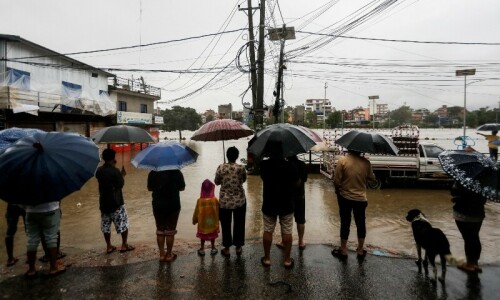
UNITED NATIONS: Most of Iran’s breaches of a UN arms embargo have been illegal weapons deliveries to Syria, which Western diplomats say were to be passed on to Lebanese and Palestinian militants, a UN report says.
The report by the UN Security Council’s so-called Panel of Experts, a newly formed committee that reports on compliance with four rounds of UN sanctions imposed on Iran for refusing to halt its nuclear enrichment program, also says Tehran flouts the sanctions as it continues to develop its atomic program.
Western powers and their allies say they suspect Iran is developing the capability to produce nuclear weapons under cover of a civilian atomic energy program. Iran insists its only aim is the peaceful generation of electricity and refuses to halt its enrichment program.
“The Panel notes that most reported incidents of conventional arms-related violations involve Syria, which has a long and close relationship with Iran,” said the confidential report, which was obtained by Reuters on Wednesday.
“In all such incidents inspected by the Panel, prohibited material was carefully concealed to avoid routine inspection and hide the identity of end-users,” it said.
The panel noted that it was likely that “transfers took place undetected and that other illicit shipments were identified but not reported to the (Sanctions) Committee.”
The report said Syria was the stated destination of the weapons in six out of nine incidents of conventional arms transfers reported to the panel. It said the panel “awaits Syria’s response to its queries.”
Israeli, US and other Western officials say that Syria has become a conduit for Iranian transfers of arms to Hezbollah militants in Lebanon and Hamas in the Gaza Strip. Iran and Syria have denied the charges.
Expanding presence in Africa
The expert panel noted that Iran appeared to be “expanding its presence in Africa, both through increased trade and diplomatic activity. Concurrent with this, it has been alleged that the IRGC (Islamic Revolutionary Guard Corps) is also expanding in the region.”
The report mentioned a case in which Nigerian authorities complained to the Iran sanctions committee about an Iranian arms shipment it seized last year. Tehran said that arms shipment was a legitimate trade deal with Gambia.
Nigeria is prosecuting one of two Iranians allegedly involved in the deal. UN diplomats say both Iranians appeared to have connections to the IRGC.
There were other cases of attempts by Iran to export conventional weapons in violation of the UN embargo. Among the countries that uncovered such attempts were Turkey, Cyprus, Germany, Israel and Britain. The weapons ranged from bullets, machine guns and explosives to small missiles and launchers, the report said.
As for Iran’s nuclear program, the report said Tehran is believed “to be coming close to exhausting its supply of uranium oxide.”
It said Iran may therefore be seeking additional sources of uranium that would be needed to realize its planned expansion of uranium enrichment activity.
The report said Iran was exploiting loopholes in the sanctions regime “by seeking to procure equipment and technology that fall below the thresholds for listed (banned) items, but which are still useful, in an attempt to evade sanctions while maintaining its nuclear activities.”
Iran has also been trying to purchase nuclear technology in developed countries with strong export controls by placing orders with intermediaries in countries without rigorous export oversight, the panel said. It added that the front companies then re-export the items to Iran.
The report concludes that the sanctions are “slowing Iran’s nuclear program but are not yet having an impact on the decision calculus of its leadership with respect to halting uranium enrichment and heavy water-related activities.”










































Dear visitor, the comments section is undergoing an overhaul and will return soon.